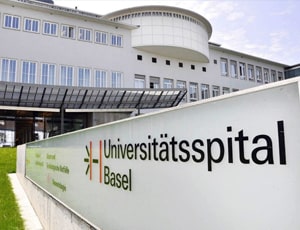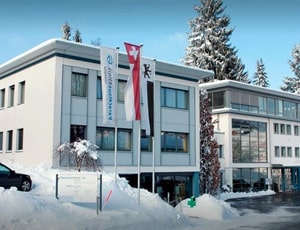The average cost of Breast Cancer Treatment in Basel approximately starts from USD 18500
Treatment cost

University Hospital located in Basel, Switzerland is accredited by ISO. Also listed below are some of the most prominent infrastructural details:


Apart from in-detail treatment procedures available, Paracelsus Clinic located in Lustmuhle, Switzerland has a wide variety of facilities available for International Patients. Some of the facilities which are provided by them are Accommodation, Airport Transfer, Choice of Meals, Interpreter, SIM, TV inside room. Also listed below are some of the most prominent infrastructural details:

Apart from in-detail treatment procedures available, Geneva Women Care located in Geneva, Switzerland has a wide variety of facilities available for International Patients. Some of the facilities which are provided by them are Accommodation, Airport Transfer, TV inside room. Also listed below are some of the most prominent infrastructural details:
Breast cancer is a type of cancer that originates in the cells of the breast. While it can occur in men as well, it is far more prevalent in women.
Following skin cancer, breast cancer stands as the second most frequently diagnosed cancer among women in the United States. However, it's crucial to recognize that breast cancer is not exclusive to women, as everyone is born with some breast tissue, making it a condition that can affect individuals of any gender.
Improved breast cancer screening techniques enable healthcare providers to detect the presence of breast cancer at an earlier stage. Early cancer detection greatly increases the chances of effective therapy and recovery.
The exact reason that causes breast cancer is unclear, even though every eighth woman suffers from it. However, several factors have been associated with the development of breast cancer. Some of the breast cancer risk factors include:
The risk of breast cancer naturally increases as women age. The risk is also higher in women who have a family history of breast or ovarian cancer, possess BRCA1 and BRCA2 genes, or have had their periods before the age of 12.
The main types of breast cancer are based on where the cancer begins, whether it's in the ducts or lobules of the breast, and whether it has spread beyond its original location. The two broad categories are in situ (confined to the site of origin) and invasive (has spread beyond the original location). Here are some common types:
Most commonly, as a part of treatment for breast cancer, surgery is conducted to remove the cancerous lump or growth from the breasts. Depending on the extent of the cancer and its stage, surgery may be accompanied by another form of treatment as well, which is conducted either before or after the surgery.
The doctor decides upon a breast cancer treatment plan that is most suitable for the patient. The decision may depend upon the extent of spread, the overall health of the patient, the stage, and the type of breast cancer (inflammatory, cancer during pregnancy, lobular carcinoma, ductal carcinoma, and invasive breast cancer).
The team that conducts breast cancer treatment includes a surgeon, a medical oncologist, and a radiation oncologist. The different breast cancer treatment options are divided into two types:
Local Treatment: This type of treatment is localized, that is, it is only used to treat one specific location or primary site affected by cancer. It does not have any impact on the rest of the body.
The following are the two types of local treatment:
The radiation can either be delivered externally or by placing a small radioactive pallet in the affected area internally. The latter form of radiation therapy is known as brachytherapy.
II. Systemic Treatment: This type of treatment involves the use of drugs that can be administered either orally or intravenously. The choice of drugs depends on the type of systemic treatment opted for, which, in turn, is dependent upon the extent and the type of cancer.
The recovery journey following breast cancer treatment, though generally less painful and traumatic than some other critical cancers, brings about certain adjustments for patients. These changes encompass various aspects of their physical and emotional well-being:
Options like cosmetic surgery provide avenues for individuals to regain a sense of normalcy.The unique challenges that breast cancer survivors face underscore the importance of comprehensive support, encompassing physical, emotional, and psychological aspects. While the journey may have its complexities, addressing these changes with a tailored and holistic approach contributes to individuals' overall well-being and resilience in their recovery.
Ask your healthcare adviser for the best multiple options and choose the one that meets your expectations
The average cost of Breast Cancer Treatment in Basel starts from $18500. OECI, TEMOS are just some of the accreditations which top hospitals in Basel hold where a Breast Cancer Treatment is conducted.
The Breast Cancer Treatment package cost in Basel varies from one hospital to another and may offer different benefits. The top hospitals for Breast Cancer Treatment in Basel covers all the expenses related to the pre-surgery investigations of the candidate. The treatment cost usually includes the expenses related to hospitalization, surgery, nursing, medicines, and anesthesia. There are many things that may increase the cost of Breast Cancer Treatment in Basel, including prolonged hospital stay and complications after the procedure.
There are several best hospitals for Breast Cancer Treatment in Basel. Some of the most renowned hospitals for Breast Cancer Treatment in Basel include the following:
Upon discharge from the hospital after Breast Cancer Treatment in Basel, the patients are advised to stay for about 26 days for recovery. During this time, the patient undergoes medical tests and consultations. this is to ensure that the treatment was successful and the patient us safe to return.
One of the topmost destinations for Breast Cancer Treatment is Basel. It has a variety of accredited hospital, affordable cost of treatment and some of the best medical fraternity. However, there are other cities as mentioned below that are popular for Breast Cancer Treatment as well:
There are certain expenses additional to the Breast Cancer Treatment cost that the patient may have to pay for. These include the cost of accommodation and meals outside hospital. The per day cost in this case may range from 100 USD.
The patient is supposed to stay at the hospital for about 4 Days after Breast Cancer Treatment surgery for monitoring and care. During the recovery, the patient is carefully monitored and control tests are performed to see that everything is okay. If required, physiotherapy sessions are also planned during recovery in hospital.
There are more than 1 Hospitals that offer Breast Cancer Treatment in Basel. These hospitals are approved to perform the surgery and have proper infrastructure to handle Breast Cancer Treatment patients. Such hospitals follow all legal protocols and guidelines as specified by the local medical affairs body when it comes to the treatment of international patients.
Some of the most sought after doctors for Breast Cancer Treatment in Basel are: